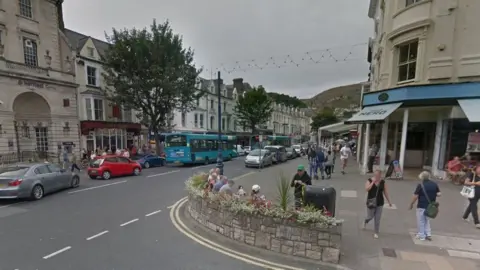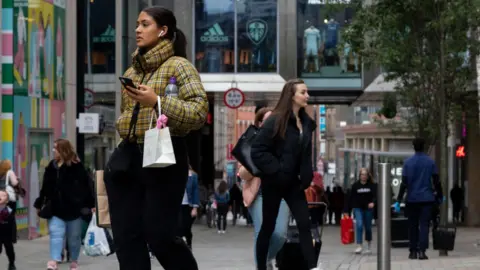Conwy council tracks people's phones to monitor footfall
 Google
GoogleA council is using people's mobile phone movements to get an insight into shoppers' habits on high streets.
Conwy council's pilot tracks people who use its free wi-fi services as they move around Llandudno's Mostyn Street.
The information will inform decisions around business hours and where further investment might be needed.
But the issue has sparked fierce debate, with Llandudno councillor Harry Saville raising concerns about how the project may affect people's privacy.
The council already has a system whereby, with their consent, the council collects data from wi-fi-users at its offices, buildings, libraries and leisure centres and uses it for marketing purposes, such as promoting events.
Now, as part of this new scheme in partnership with the Welsh government, the council is able to track wi-fi-users' mobile phones in Mostyn Street by triggering sensors.
The data collected contains no personal information, but gives the council a picture of movements around the street by tracking a device's media access control (Mac) address.
 Getty Images
Getty ImagesDiscussing the matter at a scrutiny committee meeting, Mr Saville questioned whether people's personal information was at risk from the scheme.
"I appreciate you are not capturing any personal data, but if we think, smartphones, and most people will only have one, the Mac address, the identifier in many cases, is unique," he said.
"So let's say I go down Mostyn Street, you are not able to tell who I am personally, my age, my other details, but you know where my phone has been, and someone would be able to link that to an individual wouldn't they, potentially?"
Conwy council IT manager Neil Payne replied: "Potentially, yes, if we had details of your phone contracts, which we don't have, or if you went to the mobile phone providers."
But he added: "The initial purpose of it is to monitor footfall. So all it does is picks up what we call a Mac address, a unique address, no personal details at all, and it just tracks the movement of those phones."
Kinmel Bay councillor Nigel Smith dismissed Mr Saville's arguments as "scaremongering".
"I couldn't find out what councillor Harry's Mac address is if I wanted to," Mr Smith said.
"That's the truth of the matter. I could quite easily go out and look at a registration on a car and monitor where that car goes, and nobody worries about that."
The committee voted against Mr Saville's proposal to stop the pilot.